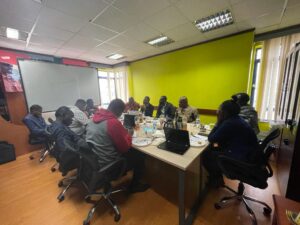On August 6 – 9, members of the Action Group on Free Civic Space (AGFCS) embarked on the return leg of the learning exchange program between Kenyan and Nigerian civil society coalitions working to defend the civic space in both countries. During the learning visit to Kenya, AGFCS’s 3-person delegation comprising S4C, RULAAC, and CCECP met with leading civil society organizations (CSOs), regulatory bodies, and civil society coalitions such as the members of the National Working Group (NWG) of Kenya’s terrorism financing risk assessment of the non-profit sector, the NGO Coordinating Board of Kenya, Coast Civil Society Network on Human Rights (CCSNHR), among others. Recall that Kenyan activists had visited Nigeria in July during the first leg of the learning exchange program, where they learned about authoritarian trends narrowing the civic space in Nigeria and how local movements and coalitions are pushing back.
Meetings held with leaders of leading CSOs in Mombassa and Nairobi afforded the Nigerian delegation the opportunity to learn about Kenya’s counterterrorism (CT) framework and its implications for the civic space. The primary CT legislation in Kenya is the Prevention of Terrorism Act 2012, complemented by the Proceeds of Crime and Anti-Money Laundering Act (POCAMLA) 2012. As has been witnessed in many jurisdictions, implementing anti-terrorism laws is fraught with numerous challenges, especially the tendency for governmental bodies to exploit counterterrorism measures as a pretext for curtailing civil liberties and tightening the operating space for civil society.
Popular tactics for stifling civic rights include arrests, prosecutions, terrorist designations, forced disappearances, freezing bank accounts, revoking or suspending operational licenses etc,. Others include office raids and seizing equipment such as computers, phones, files, and servers, effectively disrupting the normal functioning of targeted organizations. Affected groups in Kenya have responded to these security-induced infringements using strategic litigation. The judiciary has notably played an important role in reinstating the operational licenses of civic groups and righting other wrongs, attesting to the relative independence of the Kenyan judiciary. However, disobedience to court orders by security agencies still holds sway.
AGFCS is a coalition of Nigerian organizations working to defend state-sanctioned and digital restrictions on the civic space. At the meeting with the CCSNHR leadership, they learned about the group dynamics, resource-sharing, and governance structures in Kenya, and how collective action potentials are harnessed toward the pursuit of common objectives. For instance, CCSNHR issues urgent actions and renders support to members affected by the repressive actions of state actors. This includes media reportage of incidents, offering secure accommodation, and financial aid to victims of governmental crackdowns.
Another point of learning and comparison is the terrorism financing risk assessment of the NPO sector in Kenya. Discussions revealed how Kenyan organizations and institutions are extensively relying on the knowledge products and educational materials produced by Spaces for Change. The substantial value derived from S4C’s various reports, particularly Unpacking the Official Construction of Risks and Vulnerabilities for the Third Sector in Nigeria and the R8 Progress Report In Nigeria: the Stepping Stones to Reform. have significantly provided strategic direction to the NWG while enhancing the quality of its engagement with state entities conducting the assessment.
The exchange program wrapped up with a courtesy visit to the headquarters of Kenya’s NGO Coordinating Board where they gained deep insights into the collaborative initiatives between the Board and NGOs. They also learned how oversight bodies are responding to certain regulatory challenges such as NGOs’ low compliance with mandated obligations. Unlike Nigeria that has a centralized corporate regulation system through the Corporate Affairs Commission (CAC), Kenya employs a decentralized regulatory model for incorporated entities. However, a new regulatory framework, the Public Benefit Organization Act, is awaiting implementation. This new legislation aims to centralize the coordination and regulation of incorporated entities under a single entity.
Both the visit of the Kenyan delegation to Nigeria, and the return leg by the Nigerian delegation to Kenya not only demonstrate the power of mutual learning, but also show how knowledge-sharing and good practice remodeling on a peer-to-peer basis can engender social change. The closing down of democratic spaces and the repression of civil society are commonplace in the two countries, making it imperative for groups to learn from each other’s experiences while drawing important lessons that can inform their individual and collective advocacy strategies. What the learning exchange program, supported by the Fund for Global Human Rights (FGHR), has done is to provide a valuable starting point for mutual learning at the regional level, toward strengthening the capacities of national activists to explore solutions to common problems.





















